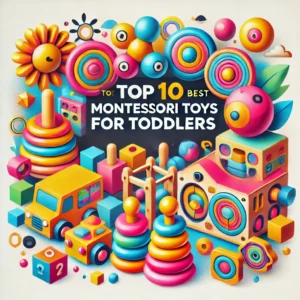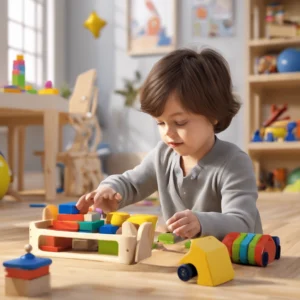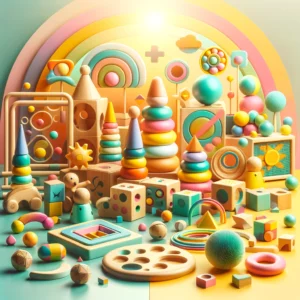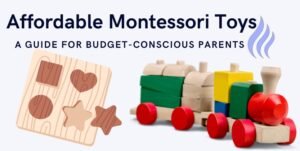Table of Contents
Best Montessori Educational Toys for Cognitive Development
Introduction
As parents, we’re always looking for the best ways to nurture our child’s growth, and the right toys can play a significant role in this. When it comes to fostering early childhood development, Montessori educational toys have proven to be an excellent choice. Rooted in the philosophy of Dr. Maria Montessori, these toys are designed to support children’s cognitive development, helping them learn essential skills while also encouraging independent play.
In this article, we’ll dive into some of the best Montessori educational toys available, how they contribute to mental and physical growth, and what parents should look for when choosing these toys.
What Are Montessori Toys?
Montessori toys are unique in that they follow the principles of Montessori education, which emphasizes hands-on, self-directed learning. The toys are designed to be simple, purposeful, and encourage exploration. Unlike traditional toys, Montessori toys usually avoid flashy lights, loud sounds, or complex mechanisms. Instead, they promote focus and creativity by letting children engage with them on their terms.
How Montessori Toys Support Cognitive Development
Montessori toys are excellent tools for developing cognitive skills. They encourage children to solve problems, think critically, and approach tasks with independence. By engaging with these toys, kids can strengthen their concentration, build memory, and even develop early math and language skills.
For instance, wooden puzzles or shape sorters encourage problem-solving as the child figures out which shape fits into which slot. Toys like building blocks can improve spatial awareness and logical thinking, while others foster skills like color and shape recognition.
Top Montessori Educational Toys for Cognitive Development from Amazon Best Sellers
We’ve scoured Amazon’s best sellers to bring you a selection of Montessori-inspired toys that foster cognitive growth. Let’s look at the features, educational benefits, and potential drawbacks of each one.
Toy 1: Melissa & Doug Wooden Building Blocks Set
Features
The Melissa & Doug Wooden Building Blocks Set comes with 100 solid wood pieces in four different colors and nine shapes. It encourages free-form building and imaginative play.
Educational Benefits
This set promotes cognitive development through problem-solving and creativity. It’s also excellent for improving spatial reasoning as children figure out how to stack blocks and create structures. The varying shapes and colors help with early math concepts like sorting and pattern recognition.
Potential Drawbacks
Some parents may find the pieces too small for younger children, and there’s a possibility of the blocks being misplaced easily.
Comparison with Other Block Sets
Compared to plastic block sets, the Melissa & Doug set feels more durable and eco-friendly due to its wooden material, offering a more tactile experience.
Toy 2: Lovevery Play Kits
Features
Lovevery offers a subscription service where parents receive a kit every few months, filled with Montessori-style toys that are tailored to the child’s developmental stage.
Educational Benefits
These play kits are designed by experts to promote cognitive, motor, and emotional skills. The toys in the kits often encourage sensory exploration and problem-solving, which are critical for brain development.
Potential Drawbacks
The subscription model can be expensive, especially if you plan to continue it long-term.
Comparison with Other Subscription Kits
Lovevery stands out from competitors because it’s specifically designed with Montessori principles in mind, making it highly relevant for parents seeking educational toys.
Toy 3: Montessori Wooden Stacking Rings
Features
The classic wooden stacking rings come in varying sizes and colors, allowing children to stack them in different ways.
Educational Benefits
This toy supports hand-eye coordination, fine motor skills, and spatial reasoning. It’s a simple but effective way for children to understand size relationships and improve their problem-solving abilities.
Potential Drawbacks
Some parents might feel it’s too basic, especially for older toddlers who may need more complex challenges.
Comparison with Other Stacking Toys
While plastic stacking toys are common, the wooden rings provide a more natural, eco-friendly option that aligns with Montessori’s emphasis on simplicity.
Toy 4: Hape Pound & Tap Bench with Slide Out Xylophone
Features
This is a multi-functional toy where children can pound balls through holes, which in turn, make sounds on a xylophone below.
Educational Benefits
This toy is excellent for hand-eye coordination, rhythm, and auditory exploration. It introduces children to cause-and-effect relationships, a crucial cognitive skill.
Potential Drawbacks
The music aspect may get repetitive, which could lead to quick disinterest.
Comparison with Other Musical Toys
Compared to electronic musical toys, the Hape Pound & Tap Bench offers a more interactive and hands-on experience.
Toy 5: PlanToys Geometric Sorting Board
Features
This toy includes different geometric shapes that fit into corresponding holes, encouraging sorting by shape and color.
Educational Benefits
It enhances logical thinking, problem-solving, and categorization skills. Children also develop fine motor skills as they manipulate the pieces.
Potential Drawbacks
The toy’s simplicity may limit its longevity as children outgrow it quickly.
Comparison with Other Shape Sorting Toys
PlanToys offers a more sustainable and eco-friendly alternative, with its focus on wooden materials and safe, non-toxic finishes.
Practical Tips for Choosing the Right Montessori Toys
When selecting Montessori toys, especially for cognitive development, consider these factors:
- Age Appropriateness: Ensure the toy matches your child’s developmental stage.
- Skill Development: Look for toys that encourage problem-solving, focus, and independent learning.
- Durability and Safety: Choose toys made from non-toxic, durable materials. Wooden toys often last longer and are safer for younger children.
Montessori Toys for Physical Development
Montessori toys aren’t just for cognitive development. Many toys also promote physical growth, such as fine and gross motor skills. Toys like wooden puzzles improve dexterity, while balance boards or ride-on toys help with coordination and muscle strength.
The Balance Between Fun and Learning
Montessori toys perfectly balance fun and learning. While children enjoy playing, they’re also gaining valuable skills that support their mental and physical development. The idea is to create an environment where learning is a natural byproduct of play.
Potential Drawbacks and Considerations
While Montessori toys are wonderful, they come with some challenges:
- Expense: Some Montessori toys can be pricey due to their high-quality materials.
- Longevity: Certain toys may be outgrown quickly, which can be frustrating for parents.
Comparison of Montessori Toys vs. Traditional Toys
Montessori toys focus on fostering cognitive development through simple, natural play, while traditional toys often rely on entertainment and sensory overload. Montessori toys tend to be more sustainable and eco-friendly, often made from wood instead of plastic.
Conclusion
Choosing the right Montessori educational toys can significantly contribute to your child’s cognitive and physical development. By selecting toys that encourage problem-solving, creativity, and independent play, you’re setting your child up for success. Keep in mind the practical tips, and don’t forget to balance fun with learning.
FAQs
- How do Montessori toys differ from traditional toys? Montessori toys focus on simplicity, learning, and self-directed play, unlike traditional toys that often prioritize entertainment.
- Are Montessori toys suitable for all ages? Yes, Montessori toys are available for a wide age range, from infants to preschoolers, and are designed to grow with your child.
- Can Montessori toys help with emotional development? Absolutely! Many Montessori toys encourage independence and self-confidence, which are key components of emotional development.
- What should I avoid when choosing Montessori toys? Avoid toys that are overly complex or rely on batteries, as these can distract from focused, self-directed learning.
- How often should I rotate Montessori toys? Rotating toys every few weeks keeps things fresh and ensures your child stays engaged.




